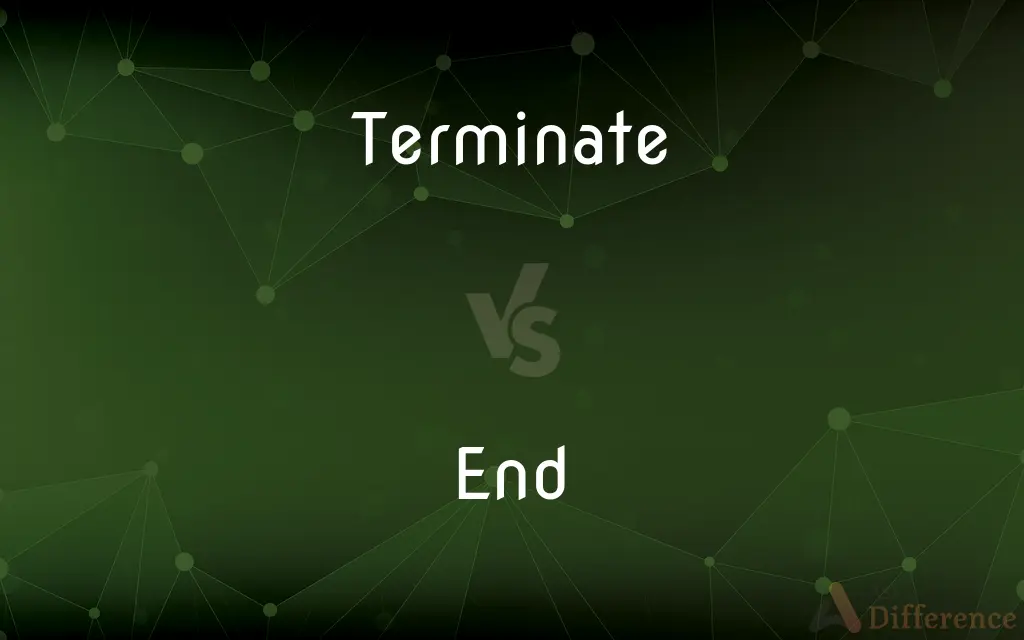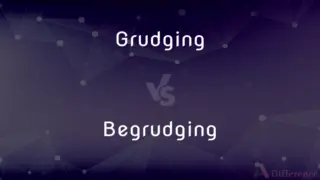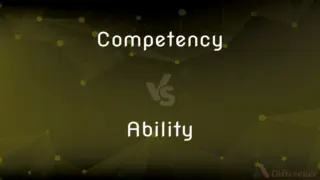Terminate vs. End — What's the Difference?
Edited by Tayyaba Rehman — By Urooj Arif — Updated on April 30, 2024
Terminate often implies a formal or abrupt conclusion, whereas end can refer to a natural or expected conclusion.

Difference Between Terminate and End
Table of Contents
ADVERTISEMENT
Key Differences
Terminate typically implies an abrupt or definitive conclusion to a process or contract, signaling a deliberate action to halt progression. Whereas, end may denote the natural or scheduled conclusion of an event or period, without the implication of forceful or sudden action.
Terminate is often used in formal contexts, such as legal, contractual, or employment scenarios, to indicate the conclusion of obligations or agreements. On the other hand, end is more versatile and used in a wide range of situations, from the simple cessation of an activity to the conclusion of a period in time.
In legal terms, to terminate a contract means to legally bring it to an end, often due to breach or other extraordinary circumstances. Whereas, to end a contract usually refers to the completion of the terms as originally agreed upon without any special intervention.
In computing, to terminate a process means to forcefully stop it, often when it is no longer responding or is undesired. Meanwhile, to end a process typically means the process completes its task and ceases operation as expected.
Terminate can carry connotations of abruptness and sometimes negativity, suggesting an intervention is necessary to halt something undesirable or unsustainable. Whereas, end can carry a more neutral or even positive connotation, suggesting a planned or expected conclusion.
ADVERTISEMENT
In narratives or discussions, terminate is used to emphasize the finality and decisiveness of an action. In contrast, end can suggest a more passive passage of time leading to a conclusion, without the active intervention implied by terminate.
Comparison Chart
Connotation
Formal, abrupt
Natural, expected
Usage Contexts
Legal, contracts, employment
General, broad usage
Implication
Forceful conclusion, intervention
Completion of natural progression
Typical Scenarios
Terminating employment, contracts
Ending a meeting, a season
Emotional Implication
Often negative
Neutral or positive
Compare with Definitions
Terminate
To bring to an end forcefully.
The company decided to terminate the project due to budget cuts.
End
To conclude a period or season.
The fiscal year ends in September.
Terminate
To conclude an agreement or contract formally.
She was relieved when her company decided to terminate her non-compete agreement.
End
To stop or cease.
The rain ended just before our scheduled walk.
Terminate
To end employment or services.
The firm terminated the consultant after the audit was complete.
End
To come to a halt naturally.
The road ends at the coastline.
Terminate
To stop the operation of a machine or process.
The system will automatically terminate idle processes to save energy.
End
To bring to a conclusion or finish.
The event will end at midnight.
Terminate
To end a biological or ecological existence.
The pesticide was used to terminate the infestation of pests.
End
To finish a task or duty.
He ended his speech with a quote.
Terminate
To bring to an end or halt
"His action terminated the most hopeful period of reform in Prussian history" (Gordon A. Craig).
End
Either extremity of something that has length
The end of the pier.
Terminate
To occur at or form the end of; conclude or finish
A display of fireworks that terminated the festivities.
End
The outside or extreme edge or physical limit; a boundary
The end of town.
Terminate
To discontinue the employment of; dismiss
A company that terminated 300 workers.
End
The point in time when an action, event, or phenomenon ceases or is completed; the conclusion
The end of the day.
Terminate
To murder or assassinate (someone).
End
A result; an outcome.
Terminate
To come to an end; reach a stopping point
The oil pipeline terminates at a shipping port. The negotiations terminated with a celebration.
End
Something toward which one strives; a goal.
Terminate
To form an end or produce a result. Often used with in
"The Peloponnesian war ... terminated in the ruin of the Athenian commonwealth" (Alexander Hamilton).
End
The termination of life or existence; death
“A man awaits his end / Dreading and hoping all” (William Butler Yeats).
Terminate
(transitive) To end something, especially when left in an incomplete state.
To terminate a process before its completion
To terminate an effort, or a controversy
End
The ultimate extent; the very limit
The end of one's patience.
Terminate
(transitive) To conclude.
End
(Slang) The very best; the ultimate
This pizza's the end.
Terminate
(transitive) To set or be a limit or boundary to.
To terminate a surface by a line
End
A remainder; a remnant.
Terminate
To kill someone or something.
The enemy must be terminated by any means possible.
End
A share of a responsibility or obligation
Your end of the bargain.
Terminate
To end the employment contract of an employee; to fire, lay off.
End
A particular area of responsibility
In charge of the business end of the campaign.
Terminate
(intransitive) To end, conclude, or cease; to come to an end.
End
A warp end.
Terminate
(intransitive) Of a mode of transport, to end its journey; or, of a railway line, to reach its terminus.
This train terminates at the next station.
End
(Football) Either of the players in the outermost position on the line of scrimmage. Offensive ends are eligible to catch passes.
Terminate
(intransitive) To issue or result.
End
To bring to a conclusion
Let's end this discussion.
Terminate
Terminated; limited; bounded; ended.
End
To form the last or concluding part of
The song that ended the performance.
Terminate
Having a definite and clear limit or boundary; having a determinate size, shape or magnitude.
Mountains on the Moon cast shadows that are very dark, terminate and more distinct than those cast by mountains on the Earth.
End
To destroy
Ended our hopes.
Terminate
(mathematics) Expressible in a finite number of terms; (of a decimal) not recurring or infinite.
One third is a recurring decimal, but one half is a terminate decimal.
End
To come to a finish; cease
The rain ended.
Terminate
To set a term or limit to; to form the extreme point or side of; to bound; to limit; as, to terminate a surface by a line.
End
To arrive at a place, situation, or condition as a result of a course of action. Often used with up
He ended up as an adviser to the president. The painting ended up being sold for a million dollars.
Terminate
To put an end to; to make to cease; as, to terminate an effort, or a controversy.
End
To die.
Terminate
Hence, to put the finishing touch to; to bring to completion; to perfect.
During this interval of calm and prosperity, he [Michael Angelo] terminated two figures of slaves, destined for the tomb, in an incomparable style of art.
End
The terminal point of something in space or time.
At the end of the road, turn left.
At the end of the story, the main characters fall in love.
Terminate
To be limited in space by a point, line, or surface; to stop short; to end; to cease; as, the torrid zone terminates at the tropics.
End
(by extension) The cessation of an effort, activity, state, or motion.
Is there no end to this madness?
Terminate
To come to a limit in time; to end; to close.
The wisdom of this world, its designs and efficacy, terminate on zhis side heaven.
End
(by extension) Death.
He met a terrible end in the jungle.
I hope the end comes quickly.
Terminate
Bring to an end or halt;
She ended their friendship when she found out that he had once been convicted of a crime
The attack on Poland terminated the relatively peaceful period after WWI
End
The most extreme point of an object, especially one that is longer than it is wide.
Hold the string at both ends.
My father always sat at the end of the table nearest the kitchen.
Terminate
Have an end, in a temporal, spatial, or quantitative sense; either spatial or metaphorical;
The bronchioles terminate in a capillary bed
Your rights stop where you infringe upon the rights of other
My property ends by the bushes
The symphony ends in a pianissimo
End
Result.
Terminate
Be the end of; be the last or concluding part of;
This sad scene ended the movie
End
A purpose, goal, or aim.
For what end should I toil?
The end of our club is to advance conversation and friendship.
Terminate
Terminate the employment of;
The boss fired his secretary today
The company terminated 25% of its workers
End
(cricket) One of the two parts of the ground used as a descriptive name for half of the ground.
The Pavillion End
End
(American football) The position at the end of either the offensive or defensive line, a tight end, a split end, a defensive end.
End
(curling) A period of play in which each team throws eight rocks, two per player, in alternating fashion.
End
(mathematics) An ideal point of a graph or other complex. See End (graph theory)
End
That which is left; a remnant; a fragment; a scrap.
Odds and ends
End
One of the yarns of the worsted warp in a Brussels carpet.
End
Money.
Don't give them your ends. You jack that shit!
End
To come to an end
Is this movie never going to end?
The lesson will end when the bell rings.
End
(transitive) To finish, terminate.
The referee blew the whistle to end the game.
End
The extreme or last point or part of any material thing considered lengthwise (the extremity of breadth being side); hence, extremity, in general; the concluding part; termination; close; limit; as, the end of a field, line, pole, road; the end of a year, of a discourse; put an end to pain; - opposed to beginning, when used of anything having a first part.
Better is the end of a thing than the beginning thereof.
End
Point beyond which no procession can be made; conclusion; issue; result, whether successful or otherwise; conclusive event; consequence.
My guilt be on my head, and there an end.
O that a man might knowThe end of this day's business ere it come!
End
Termination of being; death; destruction; extermination; also, cause of death or destruction.
Unblamed through life, lamented in thy end.
Confound your hidden falsehood, and awardEither of you to be the other's end.
I shall see an end of him.
End
The object aimed at in any effort considered as the close and effect of exertion; ppurpose; intention; aim; as, to labor for private or public ends.
Losing her, the end of living lose.
When every man is his own end, all things will come to a bad end.
End
That which is left; a remnant; a fragment; a scrap; as, odds and ends.
I clothe my naked villainyWith old odd ends stolen out of holy writ,And seem a saint, when most I play the devil.
End
One of the yarns of the worsted warp in a Brussels carpet.
End
To bring to an end or conclusion; to finish; to close; to terminate; as, to end a speech.
On the seventh day God ended his work.
End
To form or be at the end of; as, the letter k ends the word back.
End
To destroy; to put to death.
End
To come to the ultimate point; to be finished; to come to a close; to cease; to terminate; as, a voyage ends; life ends; winter ends.
End
Either extremity of something that has length;
The end of the pier
She knotted the end of the thread
They rode to the end of the line
End
The point in time at which something ends;
The end of the year
The ending of warranty period
The middle of the war
Rain during the middle of April
End
The concluding parts of an event or occurrence;
The end was exciting
I had to miss the last of the movie
End
The state of affairs that a plan is intended to achieve and that (when achieved) terminates behavior intended to achieve it;
The ends justify the means
End
A final part or section;
We have given it at the end of the section since it involves the calculus
Start at the beginning and go on until you come to the end
A whole is that which has beginning, middle, and end
End
A final state;
He came to a bad end
The so-called glorious experiment came to an inglorious end
End
The surface at either extremity of a three-dimensional object;
One end of the box was marked `This side up'
End
(football) the person who plays at one end of the line of scrimmage;
The end managed to hold onto the pass
End
One of two places from which people are communicating to each other;
The phone rang at the other end
Both ends wrote at the same time
End
A boundary marking the extremities of something;
The end of town
End
The part you are expected to play;
He held up his end
End
The last section of a communication;
In conclusion I want to say...
End
A piece of cloth that is left over after the rest has been used or sold
End
A position on the line of scrimmage;
No one wanted to play end
End
Have an end, in a temporal, spatial, or quantitative sense; either spatial or metaphorical;
The bronchioles terminate in a capillary bed
Your rights stop where you infringe upon the rights of other
My property ends by the bushes
The symphony ends in a pianissimo
End
Bring to an end or halt;
She ended their friendship when she found out that he had once been convicted of a crime
The attack on Poland terminated the relatively peaceful period after WWI
The U.S. started a war in the Middle East
The Iraqis began hostilities
Begin a new chapter in your life
End
Be the end of; be the last or concluding part of;
This sad scene ended the movie
End
Put an end to;
The terrible news ended our hopes that he had survived
Common Curiosities
What is the difference between ending a contract and terminating one?
Ending a contract usually refers to the natural expiration of its terms, while terminating a contract usually involves ending it prematurely, often due to breach or mutual agreement.
What does it mean to end a day?
To end a day typically refers to the conclusion of activities as the day transitions into night.
What does it mean to terminate something?
To terminate something means to bring it to an end, often abruptly and by deliberate action.
What scenarios typically require the use of terminate instead of end?
Terminate is usually employed in scenarios involving legal actions, contracts, or when an entity wants to forcefully stop a process or agreement due to specific reasons.
Does the term terminate imply fault or responsibility?
Terminate can imply fault or responsibility, particularly in contexts like employment or contractual agreements where one party's action or inaction prompts termination.
Can you terminate a personal relationship?
While "terminate" can technically be used to describe the end of a personal relationship, it is unusual and overly formal; "end" is much more common and appropriate in personal contexts.
Can end and terminate be used interchangeably?
While they can sometimes be used interchangeably, 'terminate' often carries a more forceful or formal connotation than 'end'.
What does it mean to end a journey?
To end a journey means to conclude travel or arrive at a destination, typically after all planned or expected parts have been completed.
Is it correct to say terminate a meeting?
It's more common to say end a meeting unless you wish to imply that the meeting was abruptly or prematurely stopped.
How does the emotional impact differ between ending and terminating something?
Ending something often carries a neutral or natural connotation, while terminating something can evoke stronger emotions, such as relief or distress, due to its abrupt and forceful nature.
Share Your Discovery

Previous Comparison
Grudging vs. Begrudging
Next Comparison
Competency vs. AbilityAuthor Spotlight
Written by
Urooj ArifUrooj is a skilled content writer at Ask Difference, known for her exceptional ability to simplify complex topics into engaging and informative content. With a passion for research and a flair for clear, concise writing, she consistently delivers articles that resonate with our diverse audience.
Edited by
Tayyaba RehmanTayyaba Rehman is a distinguished writer, currently serving as a primary contributor to askdifference.com. As a researcher in semantics and etymology, Tayyaba's passion for the complexity of languages and their distinctions has found a perfect home on the platform. Tayyaba delves into the intricacies of language, distinguishing between commonly confused words and phrases, thereby providing clarity for readers worldwide.
















































